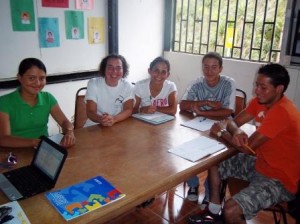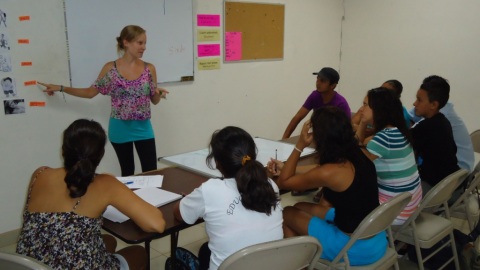Costa Rica Teaching News – One of the more frustrating aspects of attempts at entering a new field is a lack of experience. Potential employers look for that intangible amount of experience but would rather not provide the opportunity to reach that requisite. The ESL world is no different. There is big money to be made and large contracts to be signed around the world to teach the elite and affluent. To have your signature on such contracts you will require relevant experience. For those lacking experience but with aspirations to reach that level of ESL instruction, allow me introduce you to Costa Rica.
 Nobody comes here to get rich; much less if your goal is to teach English. With low salaries, often less than ideal working conditions and little hope of being a legal worker, why teach in Costa Rica?
Nobody comes here to get rich; much less if your goal is to teach English. With low salaries, often less than ideal working conditions and little hope of being a legal worker, why teach in Costa Rica?
The answer is experience.
For those looking to get their feet wet in the industry, Costa Rica is a great launching pad. One of the first lines TESOL instructors or academic managers – in an attempt to manage the expectations of their students and employees – will tell you is that if your intention is to leave having padded your savings account, you have come to the wrong place. If this line surprises anyone on the receiving end it means that person did not do enough research before arriving.
Just as disclaimers are part of the job, and responsibility, of language schools and training centers, so is coming to this country for the right reasons for aspiring teachers. As I’ve written in previous columns, those who get burned here are those who lack an accurate grasp of what the ESL market in Costa Rica is. Those who use it for what its purpose is– career wise – are the people that take full advantage of the metaphorical ESL fruit.
The trade-off of low salaries is the opportunity to teach. Qualification to teach at a language school here is often no more than a Bachelor’s Degree and a TESOL, TEFL or equivalent certification. Language schools will tell you that experience is necessary, but, generally speaking, it is simply seen as a bonus. Costa Rica is a great start for the beginning ESL teacher.
Further to the point, it’s also a great landing spot for the vacationing ESL teacher. Teaching English is a great way to fund a temporary stay in another country and this nation’s beauty and ease of securing a job make Costa Rica a great option. Contracts here – if you find a school that will give you one – don’t often extend past a one year commitment, making moving on to another destination easy after the completion of the contract.
Though they do exist, you will be hard pressed to find an ESL teacher with more than a year or two of experience here. The majority of teachers arrive, gain the necessary experience, and move on to other opportunities. This is the product of low wages, high demands on teachers and much better opportunities, monetarily speaking, in other parts of the world.
While abundance of money is not one of them, Latin America does offer many things. Having lived and worked in Latin America looks great on an ESL resume. The same goes for working for a reputable international language school, for which there are plenty in Costa Rica. The climate, great people and proximity to The United States, the most common country of origin for teachers here, make Costa Rica a great option for new ESL teachers. It also looks great when applying for high paying jobs overseas.
If you are thinking of making ESL a career but lack experience, Costa Rica is a great place to start.
If you want more information about teaching English in Costa Rica or getting your TEFL or TESOL certificate in Costa Rica feel free to contact Andrew at the Global TESOL College or email andrew@globaltesolcostarica.com
Originally from Toronto, Canada, Woodbury is the academic director of Global TESOL College Costa Rica , a contributor to radio program This Week in Costa Rica (http://thisweekincostarica.com/), and an independent writer based in Costa Rica.

